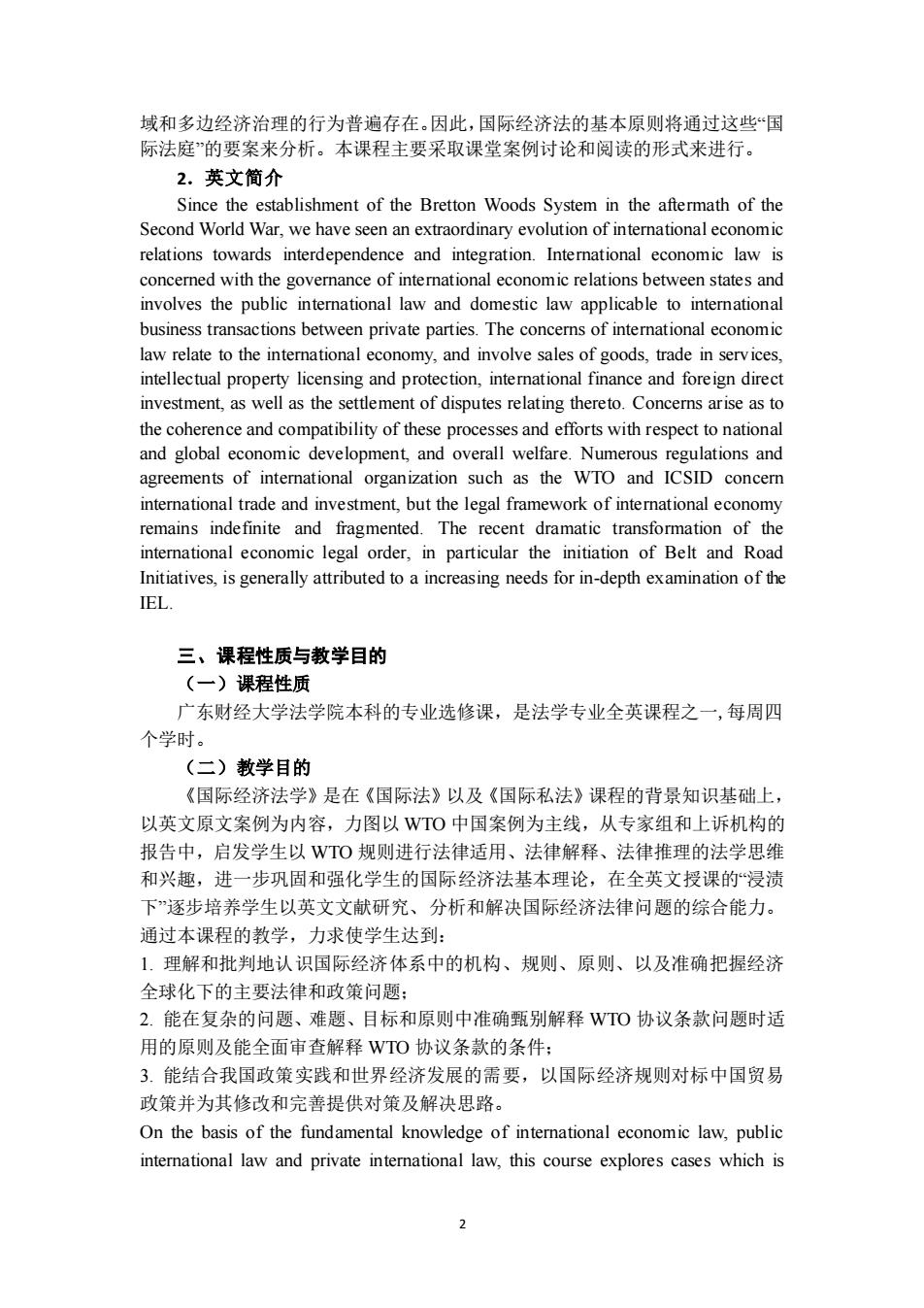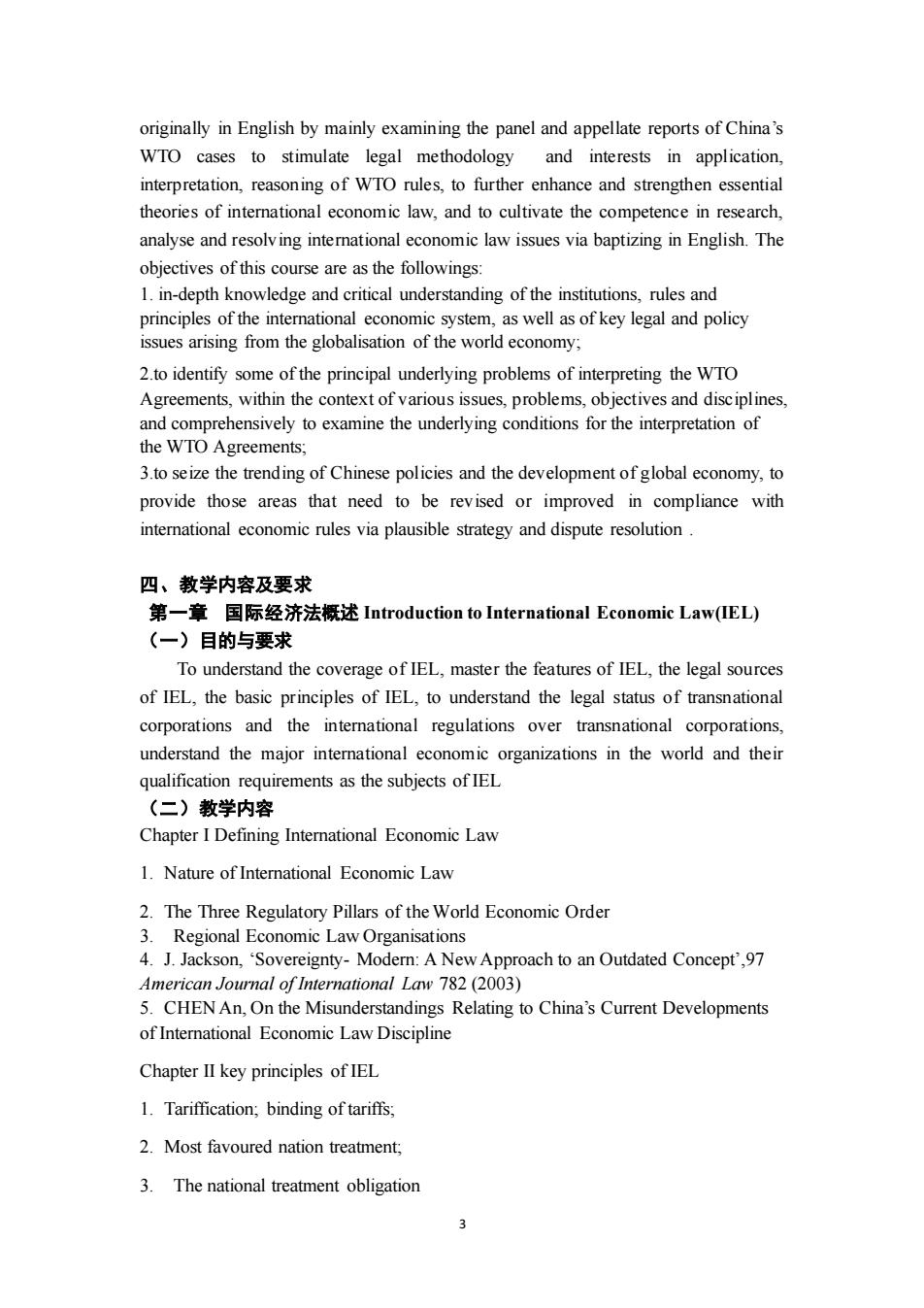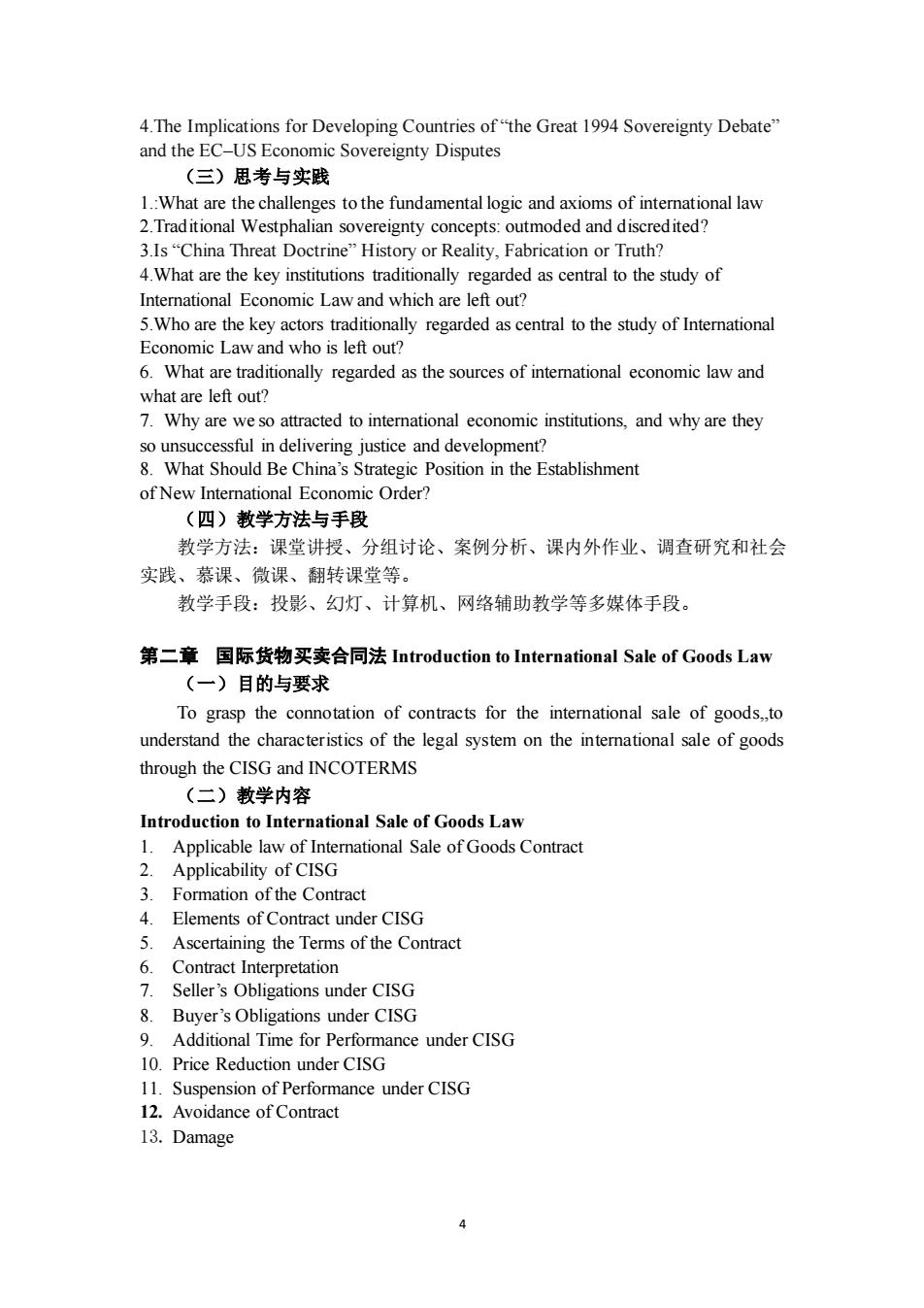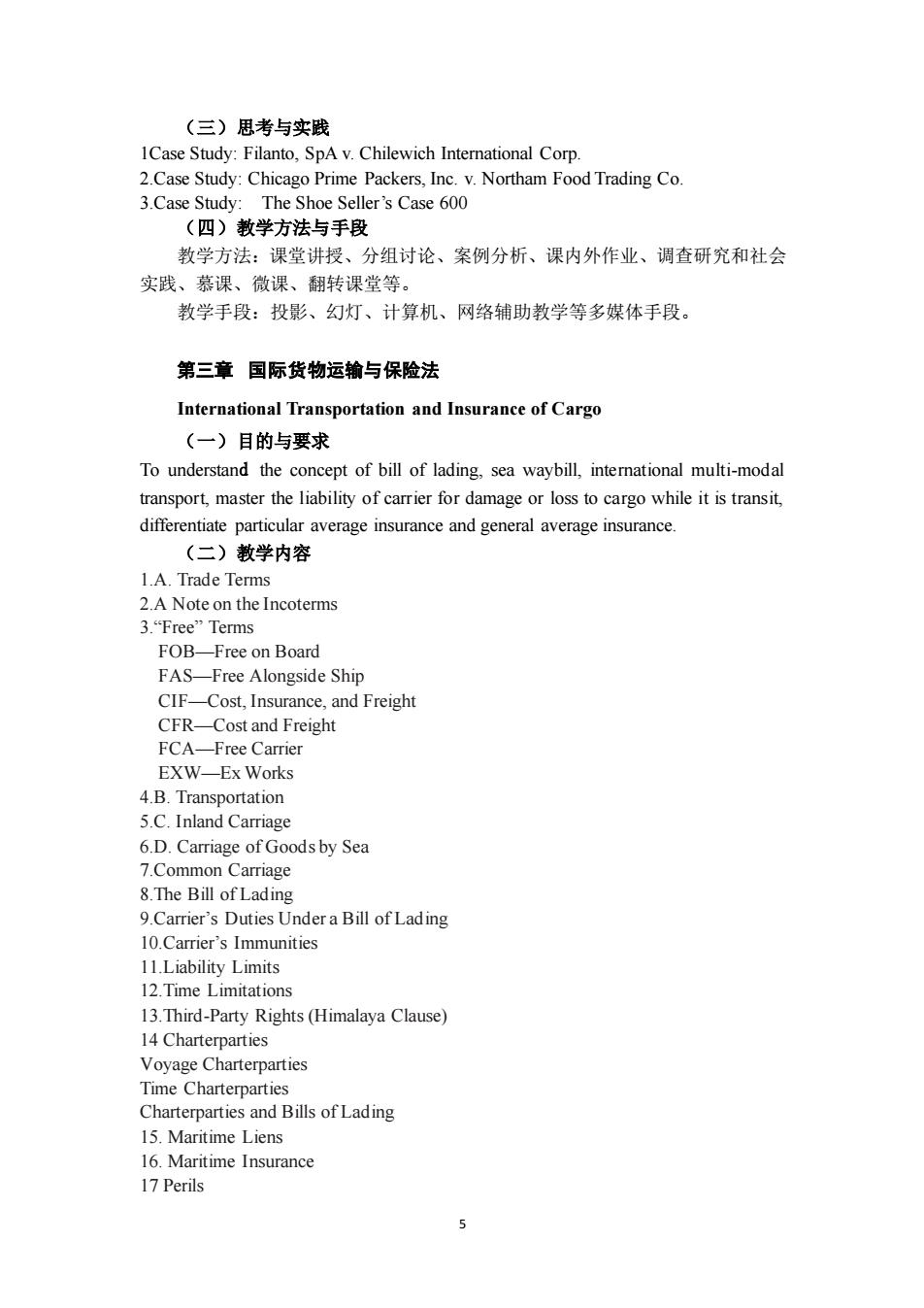
广东财经大学法学院 全英教学课程《国际经济法学》 课程教学大纲 一、课程基本信息 课程代码:20070024 课程名称:国际经济法(全英) 英文名称:International economic law(EL) 课程类别:专业课 时:64 学 分:4 适用对象:粤港澳大湾区法务班专业本科生 考核方式:考试 先修课程:法理学、民法、商法、经济法、国际公法、国际私法 球治理失灵 国际格局深刻变化,国家利益深 调整,新型治理疆域兴起 这些都呼唤着全球治理体系变革,而变革需要规范、秩序与法治。习近平总书记 强调,全球治理体系正处于调整变革的关键时期,我们要积极参与国际规则制定, 做全球治理变革进程的参与者、推动者、引领者。党的十八大以来,我国开创了 深化改革,推进“一带一路”建设和构建人类命运共同体的伟大实践。这些实践 的推进既对法学教育和法治实践提出了新要求,又是法 教有对国际法治如何守 世界贸易组织成立以来对世界经济发展尤其是中国经济的腾飞意义重大,中 国也由law-taker变成了law一maker。WT0法作为独特的多边国际法律制度,自 成立起对其规则,中国的涉诉争端案例,专家组报告,争端解决机制,上诉专家 组的改革等问题日趋受到广泛的关注。因此,以全英课教授国际经济法成为我国 入世后法学教育的重要任务,也为复合型、外向型、应用型涉外法治人才培养 实的法学专业知识。 二、课程简介 1.中文简介 战后建立布雷顿森林体系以来,我们己亲历国际关系趋向于独立和一体 化的巨大变革。国际经济法调整国家间的经济关系,涉及国际公法和国内法在私 人国际商贸领域的适用,具体涵盖国际经济中的货物、服务、知识产权授予与保 护、国际金融、外商直接投资和争端解决。这些法律的一致性和合规性问题常常 在国家和全球经济发展和福祉中存在。许多来自于WTO和ICSD这些国际组织 的国际贸易与投资规则虽已建立,但国际经济法律框架仍然无从定义并呈现碎片 化趋势。晚近以来国际经济法律秩序面临转型,尤其是“一带一路”倡议的提出, 亟需国际经济法学科的深入研究。 国际经济法的内涵与外延的定义引起不仅是学界对国际经济关系的深刻争 鸣,也是与我们对当今国际经济问题的反应高度契合的,并且使得这种国家、区
1 广东财经大学法学院 全英教学课程《国际经济法学》 课程教学大纲 一、课程基本信息 课程代码:20070024 课程名称:国际经济法(全英) 英文名称:International Economic Law(IEL) 课程类别:专业课 学 时:64 学 分:4 适用对象: 粤港澳大湾区法务班专业本科生 考核方式:考试 先修课程:法理学、民法、商法、经济法、国际公法、国际私法 全球治理失灵,国际格局深刻变化,国家利益深度调整,新型治理疆域兴起, 这些都呼唤着全球治理体系变革,而变革需要规范、秩序与法治。习近平总书记 强调,全球治理体系正处于调整变革的关键时期,我们要积极参与国际规则制定, 做全球治理变革进程的参与者、推动者、引领者。党的十八大以来,我国开创了 深化改革,推进“一带一路”建设和构建人类命运共同体的伟大实践。这些实践 的推进既对法学教育和法治实践提出了新要求,又是法学教育对国际法治如何守 正创新的积极回应。 世界贸易组织成立以来对世界经济发展尤其是中国经济的腾飞意义重大,中 国也由 law-taker 变成了 law-maker。WTO 法作为独特的多边国际法律制度,自 成立起对其规则,中国的涉诉争端案例,专家组报告,争端解决机制,上诉专家 组的改革等问题日趋受到广泛的关注。因此,以全英课教授国际经济法成为我国 入世后法学教育的重要任务,也为复合型、外向型、应用型涉外法治人才培养扎 实的法学专业知识。 二、课程简介 1.中文简介 自二战后建立布雷顿森林体系以来,我们已亲历国际关系趋向于独立和一体 化的巨大变革。国际经济法调整国家间的经济关系,涉及国际公法和国内法在私 人国际商贸领域的适用,具体涵盖国际经济中的货物、服务、知识产权授予与保 护、国际金融、外商直接投资和争端解决。这些法律的一致性和合规性问题常常 在国家和全球经济发展和福祉中存在。许多来自于 WTO 和 ICSID 这些国际组织 的国际贸易与投资规则虽已建立,但国际经济法律框架仍然无从定义并呈现碎片 化趋势。晚近以来国际经济法律秩序面临转型,尤其是“一带一路”倡议的提出, 亟需国际经济法学科的深入研究。 国际经济法的内涵与外延的定义引起不仅是学界对国际经济关系的深刻争 鸣,也是与我们对当今国际经济问题的反应高度契合的,并且使得这种国家、区

域和多边经济治理的行为普遍存在.因此,国际经济法的基本原则将通过这些“国 际法庭“的要案来分析。本课程主要采取课堂案例讨论和阅读的形式来进行。 2.英文简介 Since the establishment of the Bretton Woods System in the aftermath of the relations towards interdependence and integration.International economic law is concerned with the governance of international economic relations between states and involves the public intemational law and domestic law applicable to intemational business transactions between private parties.The concems of intemational economi law relate to the international economy,and involve sales of goods,trade in services, intellectual property licensing and protection,interational finance and foreign direct investment,as well as the settlement of disputes relating thereto.Concems arise as to the coherence and compatibility of these processes an efforts with respect to national and global economic development and overall welfare.Numerous regulations and agreements of international organization such as the WTO and ICSID concern interational trade and investment,but the legal framework of intemational economy remains indefinite and The recent dramati of the international economic legal order,in particular the initiation of Belt and Road Initiatives,is generally attributed to a increasing needs for in-depth examination of the IEL 三、课程性质与教学目的 (一)课程性质 广东财经大学法学院本科的专业选修课,是法学专业全英课程之一,每周四 个学时 (二)教学目的 《国际经济法学》是在《国际法》以及《国际私法》课程的背景知识基础上, 以英文原文案例为内容,力图以WTO中国案例为主线,从专家组和上诉机构的 报告中,启发学生以WTO规则进行法律适用、法律解释、法律推理的法学思维 和兴趣,进一步巩固和强化学生的国际经济法基本理论,在全英文授课的“浸渍 下”逐步培养学生以英文文献研究、分析和解决国际经济法律问题的综合能力。 通过本课程的教学,力求使学生达到: 1.理解和批判地认识国际经济体系中的机构、规则、原则、以及准确把握经济 全球化下的主要法律和改箭问颗: 2.能在复杂的问题、难题、目标和原则中准确甄别解释wTO协议条款问题时适 用的原则及能全面审查解释V"TO协议条款的条件: 3.能结合我因政策实践和世界经济发展的需要,以国际经济规则对标中国贸易 政策并为其修改和完善提供对策及解决思路。 On the basis of the fundamental knowledge of interational economic law,public international law and private international law,this course explores cases which is
2 域和多边经济治理的行为普遍存在。因此,国际经济法的基本原则将通过这些“国 际法庭”的要案来分析。本课程主要采取课堂案例讨论和阅读的形式来进行。 2.英文简介 Since the establishment of the Bretton Woods System in the aftermath of the Second World War, we have seen an extraordinary evolution of international economic relations towards interdependence and integration. International economic law is concerned with the governance of international economic relations between states and involves the public international law and domestic law applicable to international business transactions between private parties. The concerns of international economic law relate to the international economy, and involve sales of goods, trade in services, intellectual property licensing and protection, international finance and foreign direct investment, as well as the settlement of disputes relating thereto. Concerns arise as to the coherence and compatibility of these processes and efforts with respect to national and global economic development, and overall welfare. Numerous regulations and agreements of international organization such as the WTO and ICSID concern international trade and investment, but the legal framework of international economy remains indefinite and fragmented. The recent dramatic transformation of the international economic legal order, in particular the initiation of Belt and Road Initiatives, is generally attributed to a increasing needs for in-depth examination of the IEL. 三、课程性质与教学目的 (一)课程性质 广东财经大学法学院本科的专业选修课,是法学专业全英课程之一,每周四 个学时。 (二)教学目的 《国际经济法学》是在《国际法》以及《国际私法》课程的背景知识基础上, 以英文原文案例为内容,力图以 WTO 中国案例为主线,从专家组和上诉机构的 报告中,启发学生以 WTO 规则进行法律适用、法律解释、法律推理的法学思维 和兴趣,进一步巩固和强化学生的国际经济法基本理论,在全英文授课的“浸渍 下”逐步培养学生以英文文献研究、分析和解决国际经济法律问题的综合能力。 通过本课程的教学,力求使学生达到: 1. 理解和批判地认识国际经济体系中的机构、规则、原则、以及准确把握经济 全球化下的主要法律和政策问题; 2. 能在复杂的问题、难题、目标和原则中准确甄别解释 WTO 协议条款问题时适 用的原则及能全面审查解释 WTO 协议条款的条件; 3. 能结合我国政策实践和世界经济发展的需要,以国际经济规则对标中国贸易 政策并为其修改和完善提供对策及解决思路。 On the basis of the fundamental knowledge of international economic law, public international law and private international law, this course explores cases which is

originally in English by mainly examining the panel and appellate reports of China's WTO cases to stimulate legal methodology and interests in application interpretation,reasoning of WTO rules,to further enhance and strengthen essential theories of international economic law,and to cultivate the competence in research, analyse and resolving intemational economic law issues via baptizing in English.The obiectives of this course are as the followings: 1.in-depth knowledge and critical understanding of the institutions,rules and principles of the international economic system,as well as of key legal and policy issues arising from the globalisation of the world economy: 2.to identify some of the principal underlying problems of interpreting the WTO Agreements,within the context of various issues,problems,objectives and disciplines, and comprehensively to examine the underlying conditions for the interpretation of the WTo Agreements: 3.to seize the trending of Chinese policies and the development of global economy,to provide those areas that need to be revised or improved in compliance with intemational economic rules via plausible strategy and dispute resolution 四、教学内容及要求 第一章国际经济法概述Introduction to International Economic Law(EL) (一)目的与要求 To understand the coverage of IEL,master the features of IEL,the legal sources of IEL,the basic principles of IEL,to understand the legal status of transnational corporations and the intemational regulations over transnational corporations. understand the major international economic organizations in the world and their qualification requirements as the subjects of IEL (二)教学内容 Chapter I Defining Interational Economic Law 1.Nature of Interational Economic Law 2.The Three Regulatory Pillars of the World Economic Order Law On eations eignty- m:A Ne Approach to an Outdated Concept,97 American Journal of International Law 782 (2003) 5.CHEN An,On the Misunderstandings Relating to China's Current Developments of International Economic Law Discipline Chapter II key principles of IEL 1.Tariffication,binding of tariffs, 2.Most favoured nation treatment 3.The national treatment obligation
3 originally in English by mainly examining the panel and appellate reports of China’s WTO cases to stimulate legal methodology and interests in application, interpretation, reasoning of WTO rules, to further enhance and strengthen essential theories of international economic law, and to cultivate the competence in research, analyse and resolving international economic law issues via baptizing in English. The objectives of this course are as the followings: 1. in-depth knowledge and critical understanding of the institutions, rules and principles of the international economic system, as well as of key legal and policy issues arising from the globalisation of the world economy; 2.to identify some of the principal underlying problems of interpreting the WTO Agreements, within the context of various issues, problems, objectives and disciplines, and comprehensively to examine the underlying conditions for the interpretation of the WTO Agreements; 3.to seize the trending of Chinese policies and the development of global economy, to provide those areas that need to be revised or improved in compliance with international economic rules via plausible strategy and dispute resolution . 四、教学内容及要求 第一章 国际经济法概述 Introduction to International Economic Law(IEL) (一)目的与要求 To understand the coverage of IEL, master the features of IEL, the legal sources of IEL, the basic principles of IEL, to understand the legal status of transnational corporations and the international regulations over transnational corporations, understand the major international economic organizations in the world and their qualification requirements as the subjects of IEL (二)教学内容 Chapter I Defining International Economic Law 1. Nature of International Economic Law 2. The Three Regulatory Pillars of the World Economic Order 3. Regional Economic Law Organisations 4. J. Jackson, ‘Sovereignty- Modern: A New Approach to an Outdated Concept’,97 American Journal of International Law 782 (2003) 5. CHEN An, On the Misunderstandings Relating to China’s Current Developments of International Economic Law Discipline Chapter II key principles of IEL 1. Tariffication; binding of tariffs; 2. Most favoured nation treatment; 3. The national treatment obligation

4.The Implications for Developing Countries of"the Great 1994 Sovereignty Debate" and the EC-US Eco Sovereignty Disputes (三)思考与实践 1.:What are the challenges to the fundamental logic and axioms of international law 2.Traditional Westphalian sovereignty concepts:outmoded and discredited? 3.Is"China Threa Doctrine"His y or Reality,Fabrication or Truth? 4.What are the key institutions traditionally regarded as central to the study of International Economic Law and which are left out? 5.Who are the key actors traditionally regarded as central to the study of Interational Economic law and who is left out? 6.Wha traditionally regarded as the sources of intemational economic law and what are left out? 7.Why are we so attracted to international economic institutions.and why are they so unsuccessful in delivering justice and development? 8.What Should Be China's Strategic Position in the Establishment onomic Order? (四)教学方法与手段 教学方法:课堂讲授、分组讨论、案例分析、课内外作业、调查研究和社会 实践、慕课、微课、翻转课堂等。 教学手段:投影、幻打、计算机、网络铺助教学等名媒体手段 第二章国际货物买卖合同法Introduction to International Sale of Goods Law (一)目的与要求 To grasp the connotation of contracts for the international sale of goods.to understand the characteristics of the legal system on the intemational sale of goods through the CISG and INCOTERMS (二)教学内容 Introduction to International Sale of Goods Law 1.Applicable law of International Sale of Goods Contract Applicability of CISG Formation of the Contrac Elements of Contract under CISG 5 Ascertaining the Terms of the Contract 6 Contract Interpretation 7.Seller's Obligations under CISG 8. Buyer'sblations under C Additional Time for Performance under CISG 10.Price Reduction under CISG 11.Suspension of Performance under CISG 12.Avoidance of Contract 13.Damage
4 4.The Implications for Developing Countries of “the Great 1994 Sovereignty Debate” and the EC–US Economic Sovereignty Disputes (三)思考与实践 1.:What are the challenges to the fundamental logic and axioms of international law 2.Traditional Westphalian sovereignty concepts: outmoded and discredited? 3.Is “China Threat Doctrine” History or Reality, Fabrication or Truth? 4.What are the key institutions traditionally regarded as central to the study of International Economic Law and which are left out? 5.Who are the key actors traditionally regarded as central to the study of International Economic Law and who is left out? 6. What are traditionally regarded as the sources of international economic law and what are left out? 7. Why are we so attracted to international economic institutions, and why are they so unsuccessful in delivering justice and development? 8. What Should Be China’s Strategic Position in the Establishment of New International Economic Order? (四)教学方法与手段 教学方法:课堂讲授、分组讨论、案例分析、课内外作业、调查研究和社会 实践、慕课、微课、翻转课堂等。 教学手段:投影、幻灯、计算机、网络辅助教学等多媒体手段。 第二章 国际货物买卖合同法 Introduction to International Sale of Goods Law (一)目的与要求 To grasp the connotation of contracts for the international sale of goods,,to understand the characteristics of the legal system on the international sale of goods through the CISG and INCOTERMS (二)教学内容 Introduction to International Sale of Goods Law 1. Applicable law of International Sale of Goods Contract 2. Applicability of CISG 3. Formation of the Contract 4. Elements of Contract under CISG 5. Ascertaining the Terms of the Contract 6. Contract Interpretation 7. Seller’s Obligations under CISG 8. Buyer’s Obligations under CISG 9. Additional Time for Performance under CISG 10. Price Reduction under CISG 11. Suspension of Performance under CISG 12. Avoidance of Contract 13. Damage

(三)思考与实践 ICase Study:Filanto,SpA v.Chilewich International Corp. 2.Case Study:Chicago Prime Packers,Inc.v.Northam Food Trading Co. 3 Case Study The Shoe Seller's Case 600 (四)教学方法与手段 教学方法:课堂讲授、分组讨论、案例分析、课内外作业、调查研究和社会 实践、慕课、微课、翻转课堂等。 教学手段:投影、幻灯、计算机、网络辅助教学等多媒体手段。 第三章国际货物运输与保险法 International Transportation and Insurance of Cargo (一)目的与要求 To understand the concept of bill of lading.sea waybill intemational multi-modal transport,master the liability of carrier for damage or loss to cargo while it is transit, differentiate particular average insurance and general average insurance. (二)教学内容 LA Trade Terms 2 A Note on the Incoterms 3.pree”Tem FOB-Free on Board FAS-Free Alongside Ship CIF-Cost.Insurance.and Freigh CFR-Cost and Freight 4.B.Transportation 5.C.Inland Carriage 6.D.Carriage of Goodsby Sea 7.Comn .The Bill of Lading 9.Carrier's Duties Under a Bill of Lading 10 Carrier's Immunities 11.Liability Limits 12 Time limitations 13.Third-Party Rights(Himalaya Clause) 14 Charterparties Voyage Charterparties Time charternarties Charterparties and Bills of Lading 15.Maritime e Liens 16.Maritime Insurance 17 Perils
5 (三)思考与实践 1Case Study: Filanto, SpA v. Chilewich International Corp. 2.Case Study: Chicago Prime Packers, Inc. v. Northam Food Trading Co. 3.Case Study: The Shoe Seller’s Case 600 (四)教学方法与手段 教学方法:课堂讲授、分组讨论、案例分析、课内外作业、调查研究和社会 实践、慕课、微课、翻转课堂等。 教学手段:投影、幻灯、计算机、网络辅助教学等多媒体手段。 第三章 国际货物运输与保险法 International Transportation and Insurance of Cargo (一)目的与要求 To understand the concept of bill of lading, sea waybill, international multi-modal transport, master the liability of carrier for damage or loss to cargo while it is transit, differentiate particular average insurance and general average insurance. (二)教学内容 1.A. Trade Terms 2.A Note on the Incoterms 3.“Free” Terms FOB—Free on Board FAS—Free Alongside Ship CIF—Cost, Insurance, and Freight CFR—Cost and Freight FCA—Free Carrier EXW—Ex Works 4.B. Transportation 5.C. Inland Carriage 6.D. Carriage of Goods by Sea 7.Common Carriage 8.The Bill of Lading 9.Carrier’s Duties Under a Bill of Lading 10.Carrier’s Immunities 11.Liability Limits 12.Time Limitations 13.Third-Party Rights (Himalaya Clause) 14 Charterparties Voyage Charterparties Time Charterparties Charterparties and Bills of Lading 15. Maritime Liens 16. Maritime Insurance 17 Perils